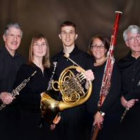The Madera Winds, formed in 2012, is a blend of Connecticut musicians who have performed over the last thirty years in other chamber music groups in Wilton as well as throughout Fairfield County.
The Madera Winds will present a program of American composers. The group’s members are:
Ralph Kirmser (oboe) of Wilton and Janet Atherton (clarinet) of Norwalk had been founding members of the Prevailing Winds Quintet since the 1980s. Rosemary Dellinger has been the bassoonist for the Connecticut Little Symphony and teaches Spanish at Cider Mill School in Wilton. Dr. Kerry Walker is professor of flute at Western Connecticut State University in Danbury. Zachary Glavin, horn, has performed with the Madera Winds for several years in Connecticut and currently resides in New York City.
Composer and pianist Amina Figarova has toured extensively concentrating on an all-original repertoire for more than 20 years. The Amina Figarova Sextet will perform Feb. 4 at Wilton Library. The sextet has triumphed at the main stage of the Newport Jazz Festival, New Orleans Jazz and Heritage Festival; has performed in Chicago, Detroit, Paris, Amsterdam, and New York and in Wilton’s Brubeck Room in 2013. Her latest album, titled Blue Whisper, is a beautiful musical journey of discovery, admiration, sensitivity and reflection.
In their new book JFK and the Reagan Revolution: A Secret History of American Prosperity, CNBC Senior Contributor Larry Kudlow and Brian Domitrovic reveal the surprising source of America’s economic growth. In his talk at Wilton Library, Kudlow will shed light on a time when bipartisanship was a driving force behind the United States’ thriving economy. In a turn of events nearly written out of history by today’s Democrats, President John F. Kennedy turned to a handful of his most trusted conservative-leaning advisors, including Republican treasury secretary Douglas Dillon, to introduce a series of economic policies, which ultimately slashed taxes across the board. Rejecting the advice of his Keynesian advisors, JFK took the advice of Dillon, who convinced him to end the dangerously high tax rates and big spending that were smothering the economy. Later undone by the government-expanding and tax-hiking mistakes of Presidents Johnson, Nixon, Ford, and Carter, it was President Ronald Reagan who, inspired by Kennedy’s policy, put in place the tax-cut revolution of the 1980s and rejuvenated the US economy once again.
